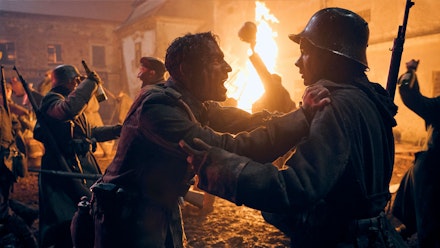This is the third cinematic adaptation of the famous novel by Erich Maria Remarque, a screed so powerful in its evocation of the realities of war and so determined in its pacifism that it was among the many books to be systematically burned by the Nazis. The first film adaptation arrived in 1930, just a year after publication, winning Best Picture at the third Academy Awards; it was then made into a TV film with Ernest Borgnine in the late 1970s. Now, with the book a staple among schoolchildren around the world, it gets another turn. This is a book so seminal, it seems, that every generation gets a cinematic turn.

This new version from director Edward Berger (perhaps best known in the UK for directing Patrick Melrose) might be the loosest take yet — here, Paul Bäumer does not briefly return home, jaded and disillusioned, as he does in the novel — but the story loses none of its power or its anger for it. A furious prologue begins not from the perspective of Paul, but another impressionable young German recruit, who quickly finds himself at the wrong end of a French bullet. Then, with a remarkable macro perspective, Berger’s camera tracks the journey of his uniform, as it is cleaned of mud and blood, reupholstered and recycled, to be sent back into the line of duty. The vast machinery of total war has rarely been depicted as viscerally or as coldly as this.
It’s all stunningly shot, with production values that rival that of Sam Mendes’ 1917.
That uniform ultimately ends up in the hands of Bäumer (Felix Kammerer, hugely impactful even when caked in mud), who is naively inspired by a disturbingly nationalistic speech to join the military effort. He and a cluster of teenage friends sign up excitedly; 18 months later, they are all either war-weary or dead. The route of this soldier’s journey will be relatively familiar to anyone who has seen a war film before (especially if it’s one of the two previous adaptations of this book), but the execution is hugely impressive.
These soldiers are sent over the top endlessly, almost repetitively, leaving us with nothing but a sense of futility. Berger’s direction remains hard-nosed throughout. Trench warfare is depicted as nothing but a failure of thoughtless, egomaniacal generals; if hunger doesn’t kill them, their orders to go over-the-top will. It’s all stunningly shot, with production values that rival that of Sam Mendes’ 1917; at times, it almost wades into horror territory, helped in no small part by the booming, anachronistic synths of Volker Bertelmann’s score. The whole experience is doom-sodden and helpless. More than anything, this is a war film that gets under your skin, and into your bones.






